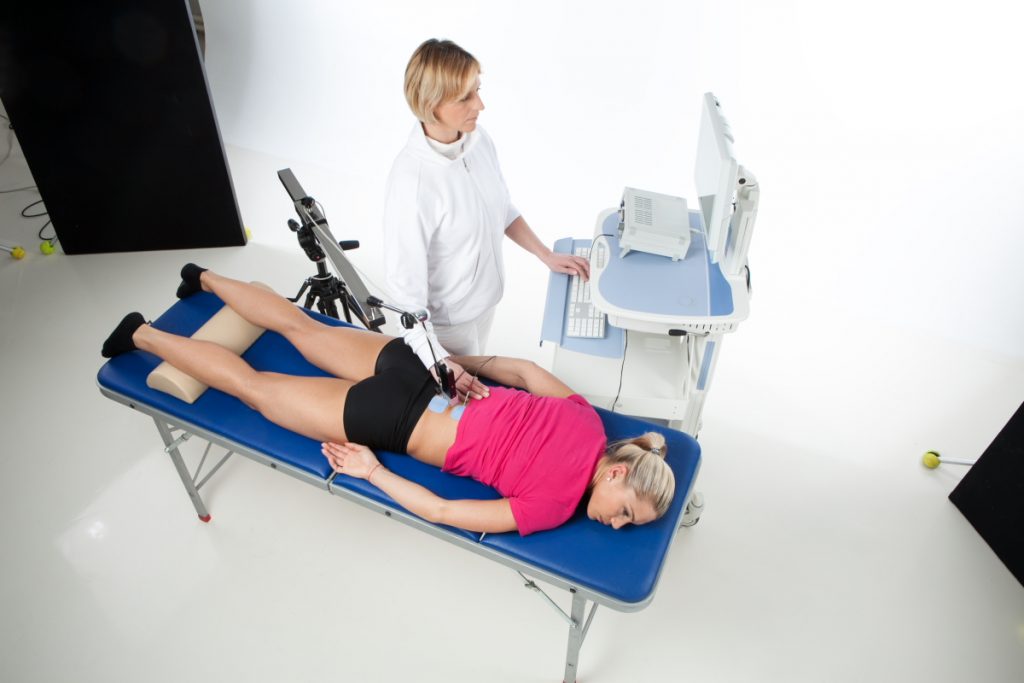
Tensiomyography is an evidence-based method which enables precise measuring of individual
muscles’ contraction characteristics – the ability of the muscle to contract/relax. This information
is crucial for the identification of injury risk, supports return to play decisions and shows change
in performance over time.
Tensiomyography is a rapidly evolving technology that is non-invasive, practical, fast and reliable.
It helps to quantify rehabilitation or training progress and consequently provides an objective
assessment of the efficiency of a certain treatment protocol. The specific muscle contraction
properties that it measures are important parameters for medical and performance staff, who are
looking for a real insight into an individual muscle’s status.
The strengths of TMG S1 are its simplicity, flexibility and compatibility with other methods and
applications on or off the field. Athletes can be profiled, monitored and guided through the
rehabilitation or training in a matter of minutes. Unlike static medical imaging, TMG S1 reveals
the true functional ability of muscles without excessive costs, time or travel. Assessments are
painless, require no effort from the athlete and can be done even during the acute phases of injury
to obtain essential, clear and objective benchmarks.

Researchers as well as sports medicine and performance professionals all have a common need
for relevant and objective information so that decisions can be made faster and be more informed.
TMG S1 provides this in an efficient, fast and simple way. Furthermore, the informative value of the
data about muscle function cannot be replicated by any other modality.
Team based scenario
https://www.youtube.com/watch?v=kCRhIYaj0jQ
Tensiomyography – Increase Athletic Performance, Prevent Injury and Rehab Faster.
TMG for decision making:

Dr Karen Hind, PhD CCD
Senior Research Fellow – Musculoskeletal Physiology. Leeds Beckett University
Sports medicine – objectively evaluate functional muscle disorders:
Medical professionals have the challenging need for screening risks, reducing non-contact
injuries, and ensuring that the return to play doesn’t result in re-injury. TMG can solve
these three problems in a fast, precise and objective manner.
When it comes to sports injuries, the most challenging issues are muscle injuries and the
way how to decide when the athletes can return to play safely. Most of diagnosis are made
on the basis of imaging diagnostics, which became a clinical standard for the evaluation of
structural injuries. However, functional muscle disorders are often underestimated clinically
and TMG can help you to evaluate them objectively.

Dr Mark Goss-Sampson MIBiol, PhD, PGDip
Principal Lecturer, Sports Sciences, University of Greenwich.
Sports performance – individualize training plans:
Performance coaches and specialists are facing similar challenges as medical professionals;
however, they also have the need to improve the athletic abilities effectively. TMG supports
performance coaches with a detailed and quantitative insight into the progression of each
sportsman individually.
TMG provides the athlete’s muscle profile, so that you get the information which muscle
needs to be faster, stronger or if you need to relax a particular muscle.
Research – support for visible scientific publications.
Tensiomyography (TMG) can support your research and help you publish papers
with a large visibility. Tensiomyography is being used by some of the most prestigious
research institutions in the world, helping them detect acute or chronic changes in the
muscle’s ability to contract/relax. Novelty, relevancy and credibility of the information
presented in a particular publication can significantly affect its impact. Tensiomyography
has been used in more than 80 scientific papers.